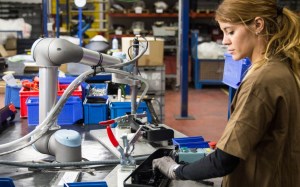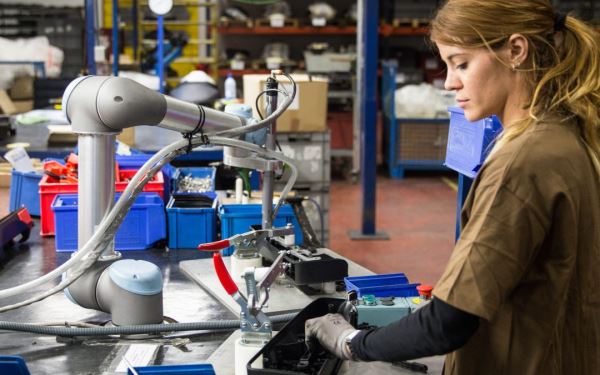As automation in the manufacturing industry continues to grow, collaborative robots (or cobots for short) are pushing their way to the forefront of the market, with global sales of cobots expected to reach $12 billion by 2025 (RIA, 2017).
Cobots are designed to work alongside their human counterparts, often in close proximity, allowing the skills of man and machine to complement each other.
And with the amount of robots in the manufacturing industry expected to increase by 17% by 2020 (IFR, 2017), the time is right to explore the many benefits cobots bring to the manufacturing floor.
1. Improve workplace health and safety
The safety of workers is paramount to any organisation, and manufacturing is no exception. The repetitive motion of performing manual tasks such as lifting, pushing, pulling, packaging and carrying is likely to cause serious injury to humans. In Victoria, 28 percent of workers in the manufacturing sector are injured due to performing manual handling. And in the UK, over eight million work days were lost due to workplace injuries caused by musculoskeletal disorders over the course of 2015 and 2016.
Cobots relieve humans from performing repetitive manual handling tasks, therefore reducing the risk of injury. Taking less time off to recover from a work-related injury means workers will maintain a higher level of productivity. Additionally, cobots can also come with built-in safety functions, such as emergency stop mechanisms and the ability to set virtual safety boundaries. These settings allow employees to work safely with and around the cobots without fear of injury, subject to risk assessment.
2. Ensure quality control
Cobots are consistent operators, as compared with industrial robots. Once programmed to the task they will perform exactly as required. The joy in cobots, however, is how the human works alongside the cobot while it performs the task. While the cobot performs repetitive tasks, humans are working alongside it, doing higher-level tasks. Ultimately, they’re working together to ensure quality control of the products. This is in stark contrast to industrial robots, where quality control is measured in batches. If a batch has performed incorrectly, all of the product must be disposed of.
Such was the case with Atria. Atria is a manufacturer of vegetarian products for convenience stores. It’s important for Atria to reduce waste to continue to offer goods at a competitive price. Since installing cobots, Atria has optimised material usage in packaging, reducing waste by 25%.
For manufacturers, creating goods of a consistently high quality is key to delivering a positive customer experience. Cobots are able to achieve just that, as Atria shows.
3. Deliver efficiency
Traditional robotics can take days to install on a manufacturing line and hours to program and reprogram. Lost time and human resources can be incredibly detrimental to an organisation.
Cobots dramatically reduce downtime. Average set-up time is half a day. Similarly, programming can be done by anyone, rather than requiring programming expertise. Cobots are also very efficient when it comes to changing tasks, with Atria experiencing 94% reduction in downtime! The reduction in downtime across multiple areas means more time on production, ultimately driving efficiencies across manufacturing and other processes within the business.
4. Drive profitability
Cobots also allow for a more efficient assembly time. By automating specific production processes, such as the repetitive tasks, cobots enable a smoother production flow. This ultimately increases product output, enabling manufacturers to deliver more product to market quicker. Manufacturing companies, such as Aurolab in India, have reported increases of 15% in product output, all while maintaining the highest level of quality.

As tools that work alongside humans, cobots hold immense potential in freeing up humans to work safer, faster and smarter on the manufacturing floor.
By relieving humans of repetitive tasks, organisations can redeploy time and resources that would traditionally be spent on human labour, back into business initiatives.
As such, it’s important for manufacturing companies to optimise the benefits of cobots in the workplace to keep costs down and remain competitive in the Australian market.
Shermine Gotfredsen is General Manager SEA & OCEANIA - Universal Robots


